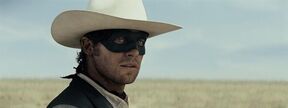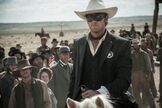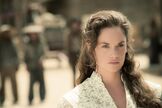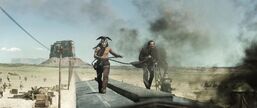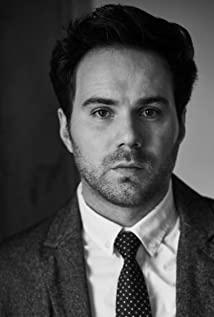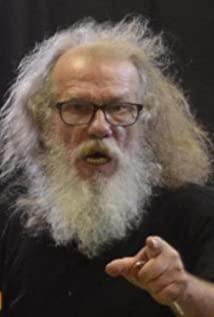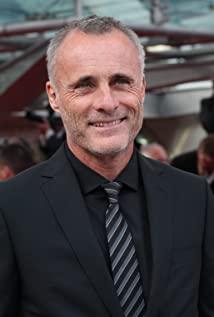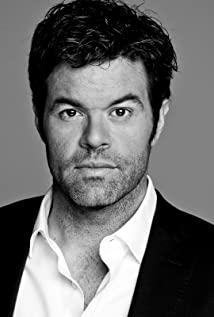First, let me explain the author's rating for the film. In fact, the author's impression of the film is average, but if the author does not have a memory disorder or strays into a different dimension, this film should be regarded as a relatively rare western film in recent years. For this, the author will add one point to the impression. . To be honest, I have seen very few Westerns, but only a handful of them. I have no concept of how to define whether a film is a Western in a strict sense. But this film has elements that I have seen in all the recognized Westerns I've seen before. Let's just think of this movie as a genuine western.
The story and performance of this film can only be described in general. Of course, the director is a good director, the screenwriter is also a good screenwriter, and the actors are still good actors, but there is almost no good chemical reaction between the three in this play. Depp is still going the same way as in Pirates of the Caribbean, but he doesn't always feel so crazy, maybe he's tired or bored, but his exaggerated style is somewhat restrained in this play. The other actors are also quite satisfactory, especially Helena Carter. The author's impression of her still remains in Bellatrix in Harry Potter, and in this film, she made a solid return to soy sauce.
The director is said to be a famous director, but the author has no impression of him at all. He seems to be the director of the Pirates of the Caribbean trilogy. Wow? Some people say that the director is making a swollen face to make a fat man, and I think so too. If the director honestly made the film into a Pirates of the Caribbean version of the western, perhaps it would not have failed so badly. It is a pity that the director wanted to add too many movie elements to the film, such as lone hero, law and justice, racial contradictions, a sense of belonging, and even wanted to incorporate reflections on various problems in the development of the American West. Stealing chickens is not the opposite of losing a handful of rice. From this point of view, this movie is not like a Western movie, but a hodgepodge of things, neither pleasing nor appetizing.
But Hans Zimmer had a few good words to say. To be honest, the soundtrack of Man of Steel really made the author feel regretful, thinking that Brother Lonely Jiang Lang was exhausted. Now that I think about it, maybe it's just that the soundtrack of the sci-fi style is heard too often, and it's a bit of aesthetic fatigue. In this play, Hans Zimmer played the western style, and the music played by the unique musical instruments of the western strengthened the western sense and picture sense of the film. The author can only sigh that the master is back. Some people say that Brother Lonely is a trick to eat all over the sky, and it is true. Since the author is a layman of rhythm, I can only express my intuitive feeling. Brother Lonely seems to like to use short rhythms. It is about 3 beats or 4 beats to form a syllable, and then repeat. The music in this play is sometimes melodious, sometimes rapid, sometimes tragic, sometimes desolate, sometimes majestic, sometimes brisk and exciting.
Especially the theme soundtrack called Finale in the film, adapted from Rossini's William Tell Overture. This music is impassioned and instantly ignites the author's G spot, which seems to be used in many westerns. The brisk rhythm of the music is perfectly combined with the picture of the lone ranger chasing the train with his horse and whip in the movie, which accelerates the rhythm of the film audibly. However, in the middle of this soundtrack, it suddenly joins the original low-pitched symphony of Lonely Brother, which is majestic and melodious, and immediately looks atmospheric. It is worth mentioning that at the end of the film's subtitles, Depp's lonely back walking on the Gobi desert appears in the middle of the screen. The soundtrack matches the screen perfectly, and a sense of loneliness and sorrow fills my heart.
The author can sum up the soundtrack of the film in this way: it is the efforts of Brother Lonely, which allows the author to clearly grasp the origin and transition of the film. This film can become a forever textbook for film soundtracks! If it weren't for the changes in the film's soundtrack, I would not have felt the ups and downs of the film's plot, nor would I have felt the thrill of the film's climax. Such a bland plot just underlines the importance of having a perfect soundtrack. In this film, the driving force of the soundtrack to the audience's emotions and storyline is unquestionable, and this is precisely the characteristic of Hans Zimmer: a very provocative and infectious soundtrack, the music is perfect with the picture and plot of the film. It fits, but that's what Man of Steel's soundtrack lacks.
The film tells a simple and bland story, a story about justice. The protagonist John was originally a dogmatist who believed in the justice of the government, but the emotional blows he received one after another made him fully understand that in front of those who abused their power to seek personal gain and disregard justice, the so-called acting for heaven can actually demonstrate justice. Hold the gun in your hands and use your righteous violence to stop unjust violence. So the protagonist puts on a mask, rides a white horse, and becomes a ranger in the desert, the last ranger. And Donto is an Indian who has lost his sense of belonging, and his guilt and guilt drive him crazy. His encounter with John rekindled his hope and decided to help John achieve justice, roaming the wilderness together and becoming a wilderness ranger.
However, this play has spent so much investment, and it must not discuss the theory of justice too much, and the film will spend all its time on action scenes. However, after actually watching the movie, the author found that the movie does not actually have many humorous sections, and the action scenes are not too exciting. Although the Indians' big charge in the second half of the film was extremely tragic, it stopped abruptly, and it did not bring much emotion. On the contrary, when the Finale sounded, the scene of John riding a horse on the roof chasing the train made the author's blood boil. This paragraph also confirms the author's previous argument: this play completely relies on the soundtrack to promote the development of the film. However, this scene is quite in line with the western movie in my mind, and the gun-fighting scene that I want to see the most is not at all, so I sigh.
Finally, let's briefly talk about the western culture in the film. To be honest, the author knows very little about the westward movement, gold rush movement, railway culture, ranger regiment culture, etc. involved in the film, but the concept of western culture is derived from some games. However, this also reflects the far-reaching influence of American Western culture on later generations to a certain extent.
Take, for example, one of my favorite games in the series, Fallout. Although Fallout is a wasteland theme built in the future, the setting of the wasteland in this game actually drags the game back to the barren west era. Isn't the scorched scorched earth in the game as mysterious, dangerous and fascinating as the Gobi in the American West. There are several of the most typical Western symbols in the Fallout series - small towns, wilderness rangers, bounty hunters, slave traders and rangers.
In this Lone Ranger (I really don't know why it is translated into this name, maybe it has something to do with the Chinese knight culture, but after all, this movie is about American Western culture, wouldn't it be better to translate it as Lone Ranger.), John It is a lone ranger, known as the last ranger, and the image of the cavalry and the setting of the masked face also have a profound impact on later film and television works. Such as Zorro, such as Indiana Jones, such as superheroes in comics, they will have their own totems, they may not necessarily cover their faces, but they will always leave a unique impression. The most important thing is that they are famous but unknown known.
Of course, it can also be seen that some cultural unity, whether it is a ranger in the west or a knight in the east, is basically based on the background of mixed dragons and snakes, and the chivalrous warriors go into the world alone. They are lonely, they are unknown, but when needed, they will do amazing feats. In that era when good people needed to cover up, the appearance of knights and rangers greatly made up for the government's shortcomings in implementing justice. It can even be boldly said that it is precisely because of their existence that justice in the world can be preserved and the rights of the people can be guaranteed. They are the real enforcers, even if violence is not real justice. Therefore, the existence of rangers and knights reveals a kind of desolation and helplessness, which just happens to constitute the most perfect image of rangers and knights in the work.
One person and one horse, the sunset afterglow, on the Gobi Desert, a tired figure dragged on the long wilderness. But as soon as the call for help came, he still whipped his whip, loaded his gun, and rode his horse to the rescue without hesitation.
Relying on the drunken official road, lying in the imperial capital with a book.
The waning blood of the waning autumn geese has broken the sound of ancient cicadas.
The blue field hangs in the wind and the dew, and the blue light shines on the guqin.
Where is the white head sent? Like a water dragon.
View more about The Lone Ranger reviews



